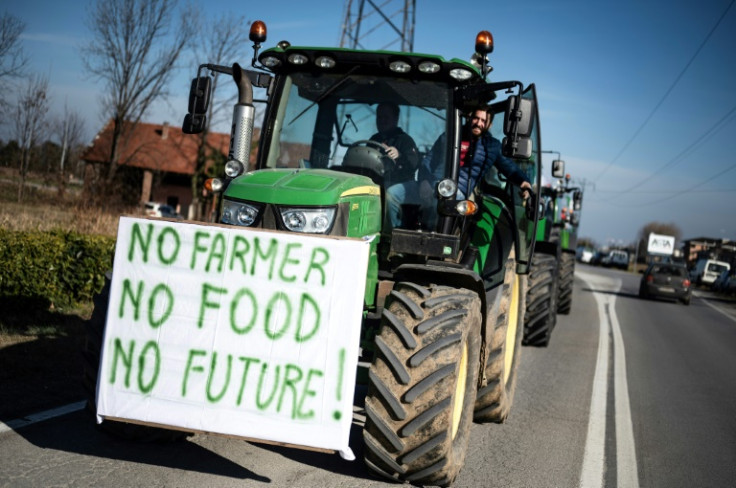
With farmers venting their anger across Europe, Brussels moved Wednesday to address two of their core grievances: creating "safeguards" to stop cheaper Ukrainian imports from flooding the market, and easing highly contested rules on leaving land unused.
Grain imports from war-torn Ukraine have already caused a standoff with Poland and become a major source of fury for farmers around the European Union.
"EU farmers put food on our table," European Commission President Ursula von der Leyen wrote on X as the measures were announced. "In hardship, we find common solutions."
Brussels underscored its support for Ukraine as it proposed extending tariff-free entry for Ukrainian farm products for another year starting in June.
But it also called for "safeguards" to stop low-cost produce from flooding the market at the expense of Europe's own farmers, with Ukrainian imports up 11 percent in value between January and September last year.
Europe's farmers blame the influx of less expensive grain, eggs and poultry for causing local prices to tank, and complain of unfair competition from producers who are not bound by EU rules, on animal welfare for instance.
The Commission's proposal allows for "quick remedial action... in case of significant disruptions to the EU market".
For the most sensitive products -- poultry, eggs and sugar -- an "emergency brake" would be used to stop future imports from rising beyond the average volumes of 2022 and 2023.
The move comes as farmers in several EU countries stage roadblocks to demand better revenues and conditions, putting Brussels under pressure to address the swelling discontent ahead of elections this year.
"We are mindful of the concerns raised by some Member States," European Commission vice president Margaritis Schinas said.
He said EU monitoring had not shown a detrimental effect on the market as a whole, but acknowledged "some adverse effects which are more localised in a few countries".
Ukraine's Prime Minister Denis Shmygal welcomed the Commission's tariff proposal, including what he called "clearer instruments of control" to avoid potential conflicts over agriculture as Ukraine seeks EU membership.
And he voiced hope the measures would be enough to persuade Poland, Slovakia and Hungary to end unilateral restrictions on Ukrainian imports, which fly in the face of EU competition rules.
Brussels separately proposed another one-year exemption -- though a partial one -- from rules forcing farmers to leave a share of their lands fallow, imposed as part of the bloc's common agricultural policy to promote biodiversity.
The rules decreeing that four percent of land must be left unused -- an ongoing gripe for European farmers -- were suspended in 2023 after Russia invaded Ukraine, to help offset the loss of grain supplies.
Farming groups and EU states including France had pushed for the exemptions to be extended after they expired at the end last year.
"This is a partial exemption limited to this year," European Commission vice president Maros Sefcovic said in announcing the new proposal.
"Weather-related disasters, geopolitical tensions, economics of agriculture, because of the high energy prices -- all these created the situations that we feel we are obliged to act under this pressure," he said.
Instead of keeping segments of arable land unproductive, farmers would be able to grow so-called "nitrogen fixing crops" such as lentils, peas or favas, or "catch crops" that are grown between regular harvests, and still meet the fallow land requirement, a commission statement said.
Farmers would then remain eligible to payments under the bloc's farm policy.
The fallow land measure will be put to a vote by member states in the coming days.
The commission's proposal on Ukraine imports has to be considered by the European Parliament and by member states, with a view to adoption by June when the current tariff exemption runs out.







